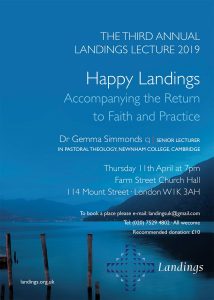CAP Poster Training Day 25 June 2019
Continue reading “Communicating the Word in our communities in preparation for the “Year of the Word””
Third Annual Landings Lecture Report 2019
Landings Third Annual Lecture April 2019
Dr. Gemma Simmonds ‘Accompanying the Return to Faith and Practice’
The talk by Dr. Simmonds was fascinating and challenging with many questions being asked of us and our faith practice. The focus of the talk was about the role of women in the Church and the myriad of reasons why women find it hard to stay in the Church, and though many do leave, yet many do say on. There were many instances throughout the talk that were easily relatable to those whom Landings reaches out to, i.e those who had distanced themselves from the Church and yet yearn to find a way back to their faith. Dr. Simmonds engaging talk certainly left us with much food for thought.
Our team – L to R
Janet Connor, Landingsuknorth, Margaret Johnston Landingsuknorth coordinator, Ellis McNorthey-Gibbs, our new LandingsUK administrator, Ruby Almeida, LandingsUK south coordinator, our speaker: Dr Gemma Simmonds CJ, Newnham College, Cambridge – and Fr. Dominic Robinson SJ, LandingsUK director.
Some comments on the day:
“To try to stem the tide, especially of women, who are leaving the faith community, Sr Gemma described components of a truly authentic welcome of those who want to return – or whom are on the cusp of leaving – with characteristic earthy passion.”
“The photos of the team…showed real joy!”
“This is such a fascinating subject…”
“I know someone who would be very interested in the setup of this ministry elsewhere…”
Third Annual Landings Lecture 2019
Dr Gemma Simmonds, CJ, Newnham College Cambridge, will address the subject:
‘Happy Landings: Accompanying the Return to Faith and Practice’
Thursday April 11th at 7:00pm in Farm Street Church Hall, 114 Mount St, London W1K 3AH
Mass in the church at 6:00pm; buffet reception to follow. Suggested donation: £10
All most welcome – to book e-mail landingsuk@gmail.com or ‘phone Fr Dominic Robinson SJ on (020)-7529-4802
Launch of the new Landings 2 Programme at Farm Street
 The first Landings 2 Programme is running at Farm Street Church. This new programme follows on from the successful Landings 1 programme that has been running for the past few years. Landings 2 is a natural progression from Landings 1 and centres on the gifts that previous participants, i.e. Returnees have that they can share with their faith community. Contact Ruby at landings.london@gmail.com if you would like to know more about Landings 2
The first Landings 2 Programme is running at Farm Street Church. This new programme follows on from the successful Landings 1 programme that has been running for the past few years. Landings 2 is a natural progression from Landings 1 and centres on the gifts that previous participants, i.e. Returnees have that they can share with their faith community. Contact Ruby at landings.london@gmail.com if you would like to know more about Landings 2
New Landings Programme at Beckenham
 Landings programme in St. Edmund’s Catholic Church, Beckenham begins next Tuesday 5th March. If you are interested in participating then please contact Andrew Baker at miriamandrew@gmail.com
Landings programme in St. Edmund’s Catholic Church, Beckenham begins next Tuesday 5th March. If you are interested in participating then please contact Andrew Baker at miriamandrew@gmail.com
LANDINGS LECTURE 2019
FARM STREET CHURCH HALL, 114 MOUNT St, LONDON W1K 3AH
THURSDAY APRIL 11TH – 7:00PM
The third annual Landings Lecture will be given by Dr Gemma Simmonds, CJ, Senior Lecturer in Pastoral Theology, Newnham College, Cambridge on ‘Happy Landings: Accompanying the Return to Faith and Practice’.
All welcome. £10 donation.
To book a place please e-mail landingsuk@gmail.com; tel: (020)-7529-4802.
Fr John Mulligan RIP

As you will be aware Fr John Mulligan died suddenly on the 6th September, the day he was due to travel to Liverpool for the Adoremus Eucharistic Pilgrimage and Conference.
The Funeral arrangements have now been made, and are as follows:
Vigil Mass
Monday 1st October, 7 pm at Saint Teresa of the Child Jesus, Morden (250 Bishopsford Road, SM4 6BZ). Please bring White Diocesan Vestments.
Funeral Mass
Tuesday 2nd October, 12 noon at Saint Teresa of the Child Jesus, Morden (250 Bishopsford Road, SM4 6BZ). Please bring White Diocesan Vestments.
Burial
Wednesday 3rd October, St. Pancras Cemetery, East Finchley. The Parish of Morden has arranged transport for parishioners to attend the burial; clergy are welcome to ‘book’ a place if they wish to share the journey (please email the parish directly for details: morden@rcaos.org.uk).
Fr John Mulligan RIP
It was a great sadness to hear of the sudden death early on the morning of Thursday September 6th of Fr John Mulligan, Parish Priest of St Teresa of the Child Jesus, Morden, Surrey, in the Archdiocese of Southwark. Fr John had been a great supporter of Landings over many years with several programmes running in his parish. We pray for the repose of Fr John’s soul and for his family, friends and parishioners at this time of shock and loss.
Fr Dominic
A New Year at Landings UK
Dear friends,
As parishes return to routine in the autumn so Landings programmes restart.
Here at the Landings UK base at Farm Street Church in London we are looking forward to the UK launch in early 2019 of Landings 2: Living in the Spirit, a follow-up programme which builds not only on Landings but can be a next step to other parish programmes forming mature disciples to take their place in the parish and in the mission of the Church. There will be publicity later.
Our other Landings centres, which cluster parishes throughout the country, will be offering Landings programmes too and these will be advertised locally as well as nationally.
As we start a new year we also start a slightly refined structure for Landings UK as Helen Carvalhido-Gilbert has stood down as national co-ordinator. Helen has done a huge amount over her four years in the role to promote Landings and to greatly improve our administration. We have much to thank her for and wish Helen well for the future.
The day-to-day promotion and administration of Landings will now be undertaken in Scotland and northern England by Margaret Johnston as Landings North Co-ordinator, landingsuknorth@gmail.com, and in the southern part of the country by Ruby Almeida as Landings London Co-ordinator, landings.london@gmail.com Margaret and Ruby are available to answer queries about Landings in their respective regions. In addition we are available at Farm Street to answer queries by telephone by ‘phoning my office on (020)-7529-4802.
Thank you for visiting our website. Please do remember the mission of Landings and all those contemplating returning to the Church in your prayers.
Yours Sincerely
Fr Dominic Robinson, SJ
Director, Landings UK
Close and Concrete: Pope Francis on how to evangelize a world in flux
Austen Ivereigh
Pope Francis’s evangelization strategy is born from the analysis of the modern world made by the Latin-American Church at its historic 2007 gathering in Aparecida, Brazil, when it called for a “pastoral and missionary conversion” in response to what it called a “change of era”. At the heart of document is understanding the current moment as a time of flux, in which technology-driven changes (liquidity, globalization) are eroding structures and institutions. Aparecida – whose main author was Cardinal Jorge Mario Bergoglio, now Pope Francis – called for a change in attitude and mindset on the part of the Church, which he summarises in two words: Vicinanza (closeness) and concretezza (concreteness).
“The Church is called to a deep and profound rethinking of its mission,” said Aparecida. “What is required is confirming, renewing, and revitalizing the newness of the Gospel rooted in our history, out of a personal and community encounter with Jesus Christ that raises up disciples and missionaries.” In the future, it noted, “a Catholic faith reduced to mere baggage, to a collection of rules and prohibitions, to fragmented devotional practices, to selective and partial adherence to the truths of the faith, to occasional participation in some sacraments, to the repetition of doctrinal principles, to bland or nervous moralizing, that does not convert the life of the baptized would not withstand the trials of time.” (See Aparecida document here)
- Technocracy
Francis spells out this “liquidity” in quite dramatic, even apocalyptic terms. He told the bishops in Brazil in July 2013: “A relentless process of globalization, an often uncontrolled process of urbanization, have promised great things. Many people have been captivated by the potential of globalization, which of course does contain positive elements. But many also completely overlook its darker side: the loss of a sense of life’s meaning, personal dissolution, a loss of the experience of belonging to any “nest”, subtle but relentless violence, the inner fragmentation and breakup of families, loneliness and abandonment, divisions, and the inability to love, to forgive, to understand, the inner poison which makes life a hell, the need for affection because of feelings of inadequacy and unhappiness, the failed attempt to find an answer in drugs, alcohol, and sex, which only become further prisons.”
He has spoken in the same vein recently about the future of Europe, about ideological colonization, in general about the loss of culture. In Santiago de Chile recently he warned: “Without the ‘us’ of a people, of a family and of a nation, but also the ‘us’ of the future, of our children and of fomorrow, without the ‘us’ of a city that transcends ‘me’ and is richer than individual interests, life will be no only increasingly fragmented, but also more conflictual and violent.”
He has highlighted the ambiguity of globalization: on the one hand drawing people closer, on the other, driving them apart. Laudato Si has many quotes from Romano Guardini’s 1950 work The End of the Modern World, especially in relation to the technocratic paradigm, Guardini’s concept of what happens when technology shapes our minds and hearts. Laudato Si’ confronts, head-on, this contemporary form of atheism in which men and women are reduced to means rather than ends, mere cogs in a machine and dispensable; hence the throwaway culture. LS counterposes the false consciousness that follows the rupture of man and nature (technocratic paradigm) and the new consciousness that will be needed to restore gift and reciprocity (integral ecology)
- Anguish
Migration as deracination (desocialization) — uprooting: (1) spatially (harder to relate to physical spaces, as well as communities); (2) existentially, in the sense of having future projects, identity; (3) spiritually, in the sense of loss of transcendence — symbols connecting present with eternal. Response to this experience of loss, of uprootedness, is another experience, not an idea: the experience of perceiving the anguish of the other, and responding to needs — spiritual as well as physical, psychological (hard to distinguish). Heart of Gospel is to create an environment of welcome that incarnates God’s welcome, one that dignifies human beings.
There is a lot of fear, especially of failure. Plunging self-esteem, rise in depression, suicide, anxiety. Lack of strong families produces stress, lack of resilience. Increasingly shaped by, and trapped by, technology, hence addiction, distraction (distracted mind = unhappy mind). The effect of the technocratic paradigm on the psyche: avoidance, rigidity, rule-following. Health is learning to live with weeds and not to be controlled by them, rather than trying to uproot them. Technocratic paradigm seeks to uproot; seeks perfection, and when this can’t be attained, there is a shutdown.
Francis sees people wanting to see Jesus, to experience an encounter with God. Impatient with sentimental, or vague spiritualities; they are TIRED OF WORDS — world is saturated with words— and in need of authentic experience. Bergoglio in 2001 called this una pastoral de encuentro – a pastoral outreach based on encounter.
What do people hunger for? (1) To reconnect with creation as creatures of God, and to experience His love and mercy. (2) To experience family: bonds of trust and unconditional love that will build resilience, character, self-esteem etc. (3) To find sanctuary: place of privacy and prayer outside technocratic paradigm. To learn contemplation.
There is a search for proximity and experience. The Church is called to be close and concrete in response to the cold abstraction and instrumentalism of the technocratic paradigm.
- Pastoral Conversion
Benedict XVI spotted the problem in 2005 when he wrote: “Being Christian is not the result of an ethical choice or a lofty idea, but the encounter with an event, a person, which gives life a new horizon and a decisive direction.” This is repeated in Aparecida, and in Evangelii Gaudium Francis says he “never tires of repeating it”.
The crisis of evangelization in the western Church was partly the result of the Church responding to the threat of relativism / secularism / individualism with an ethical response focussed on the errors of modernity and the truth of what the Church had to offer. But that religion seem like an idea, rather than “the encounter with an event, a person” – an experience. The institution had become distant. The Church was no longer evangelizing but talking to itself, focussed on preserving itself.
Francis nailed the issue in February 2015 in addressing the new cardinals. “There are two ways of thinking and of having faith: we can fear to lose the saved and we can want to save the lost. Even today it can happen that we stand at the crossroads of these two ways of thinking. The thinking of the doctors of the law, which would remove the danger by casting out the diseased person, and the thinking of God, who in his mercy embraces and accepts by reinstating him and turning evil into good, condemnation into salvation and exclusion into proclamation.”
The Church’s institutional failure – that is, its failure to evangelize, to convince, to create culture – is also its path to pastoral conversion, as Pope showed in his address to clergy in Chile. “A Church with wounds can understand the wounds of today’s world and make them her own, suffering with them”, he said. But this requires putting Christ at the centre, and receiving His mercy, as St Peter did after the Crucifixion. (Transition from Peter the failed disciple to Peter on fire as an apostle).
- Close and Concrete
This is how God saves us. They are two words of the Incarnation. Close and concrete are incarnational words: it’s how God is. So emphatic is Francis on this point that you see that this for him is at the heart of the Gospel, the contemporary spiritual battle: between what is incarnate and what is dis-incarnate. This is something Bergoglio had been saying at least since 1997, when as an auxiliary bishop he had spoken at the synod on the Americas about the “disenchantment” of the contemporary world. Faced with a lack of hope, he said, “the Lord is moved, comes down, and gets close … We must rediscover His way of coming near in order to evangelize. The key word is ‘proximity’. Encounter, conversion, communion and solidarity are the categories that express the proximity … that opens the way to hope.”
To the Polish bishops in July 2016 he said: “What would I advise? I would say – but I believe it is in the Gospel, where there is precisely the Lord’s own teaching – closeness. Today we, the Lord’s servants – bishops, priests, consecrated persons and committed laypeople – need to be close to God’s people. Without closeness, there are only disembodied words. Let us think – I like to reflect on this – of the two pillars of the Gospel. What are the two pillars of the Gospel? The Beatitudes and Matthew 25, the “criteria” on which all of us will be judged. Concreteness, closeness, touching, the corporal and spiritual works of mercy. But you are saying all this because it is fashionable to speak about mercy this year!” No! This is the Gospel! The Gospel, the works of mercy.”
Evangelii Gaudium is all about how the Church can become close and concrete, drawing alongside contemporary humanity as a pastor, servant, healer, enabling an encounter with the living God of mercy as experience, not as an idea. And how this involves a refocussing out onto the peripheries. And a very strong rejection of the temptations or distractions that prevent that: neo-Pelagianism, Gnosticism, an obsession with certain ethical issues, the mentality of it’s always been done this way, etc. etc.
The Church evangelizes through closeness and concreteness: being close to people in their concrete realities. Without closeness, the Church’s moral and ethical proclamation will seem distant and unattainable. Hw told the Bishops of Brazil: “Today, we need a Church capable of walking at people’s side, of doing more than simply listening to them; a Church which accompanies them on their journey; a Church able to make sense of the “night” contained in the flight of so many of our brothers and sisters from Jerusalem; a Church which realizes that the reasons why people leave also contain reasons why they can eventually return. But we need to know how to interpret, with courage, the larger picture.”
Whole Jubilee of Mercy was attempt to bring about this pastoral conversion: a God who is close and concrete, not distant and abstract. How can the Church better walk with people who have experienced marriage breakdown? Where is God’s grace active in their lives? The three great words of Amoris Laetitia — ACCOMPANIMENT, INTEGRATION AND DISCERNMENT — are “close and concrete” words. They are designed to point to the actions that the Church is called to carry out in the world.
- Reconciliation / return
The work of the Church on the earth is essentially God’s work of creating and reconciling. Evangelization involves both; being close and concrete involves both. Work of Landings is a great work of evangelization through reconciliation. As Francis said to the bishops in Brazil, “a Church which realizes that the reasons why people leave also contain reasons why they can eventually return.”
This requires a joint discernment in which we are all converted. Task of accompaniment, integration and discernment involves the pastoral conversion of the Church. For this, lay people are fundamental as “missionary disciples” (hence Francis’s horror of clericalism, which prevents this).
The call to Landings is to create ecology in response to technocracy, not as an idea, but as a praxis. To rebuild community, the bonds of belonging in parish, family and the environment in general, at the heart of which is the experience of the mercy of Jesus Christ.
That is Francis’s vision, drawn from Aparecida, of how you evangelize a world in flux.




